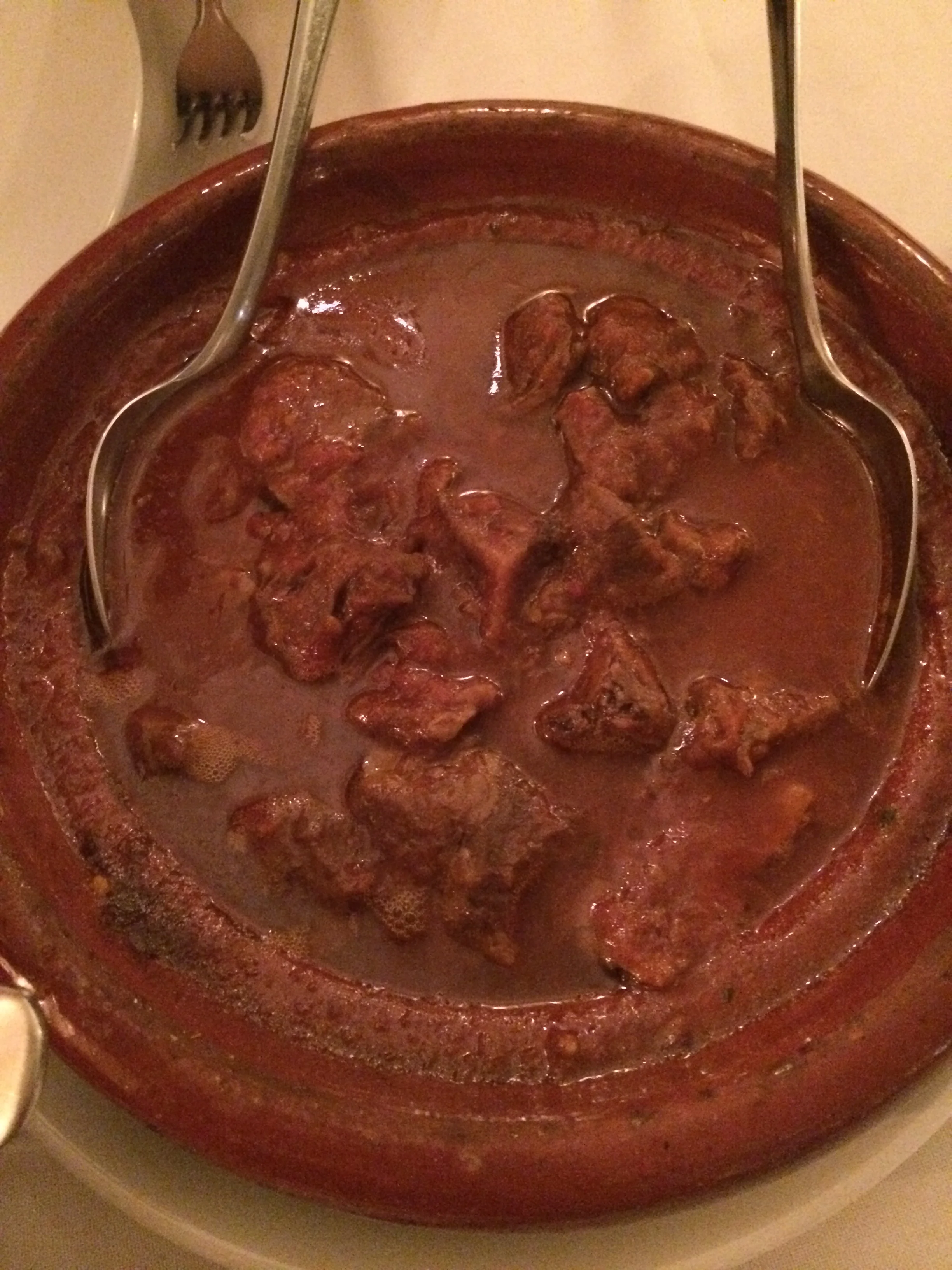It would be defensible to describe Israel as the centre of the world. This tiny piece of land between the Mediterranean and the Dead Sea is likely the most fought-over piece of real estate in history. The country, though steeped in history, is the product of modern history. After the recession of the Ottoman Empire, post-war treaties made it a British protectorate. Then, as WWII ended, Holocaust-afflicted Jews looked for a safe homeland to make their own. The Israeli question was then seriously considered. Backed strongly by the United States, the Israeli state was formed after a motion passed in the UN in 1949.
Dome of the Rock, Jerusalem
But surrounded by Arab states, which also consider Jerusalem a holy place, the country has been characterized by conflict since its creation. Today, the violence has mostly subsided though recent stirrings (such as Iranian nuclear capabilities) have destabilized the region slightly. On my visit, there were at least two unguided missiles aimed within the borders, and three Israeli teenagers taken captive by the Arabs. (The teenagers have since been murdered.)
A casual stack of guns
War culture is ever present in Israel. The sight of conscripted youth, shopping around in glitzy malls with anything from automatic rifles to grenade launchers, is simply a matter of fact. The country itself is definitively stuck in the second world.
Traveling to Israel is an adventure. At its centre is Jerusalem, the city that is holy for all Abrahamic religions. The Old City is most identifiable by a Golden dome, the Dome of the Rock, now a Muslim place of worship. It is supposedly over the stone where Abraham was told to sacrifice his son. It is, therefore, the place with the strongest connection to God. It is the holiest site in Judaism. The Jews pray at the West Wall, a remnant of the second temple. A worthwhile adventure is to take the guided tour underneath the wall. See the various cisterns and arches that made up the second temple, as well as two Boeing-weighted stones that were somehow lifted a hundred meters two thousand years ago.
Bar mitzvah at Western Wall
For Christians, the holiest place is the Church of the Holy Sepulchre. It claims to mark the place that Jesus was crucified and rose to heaven (“Calvary”). For a history of Jerusalem, go to the Tower of David museum, which recounts the history of the city through its ages. It also has a nice view of the four quarters of the city: Jewish, Muslim, Christian and Armenian. For an even nicer view, climb the Mount of Olives. At the foot is the church of Gethsemane. The adjoining garden is supposedly where Jesus was betrayed by Judas. The magnificent, storied buildings in the old city testify to the wealth of history and religious significance of Jerusalem. For some more basic pleasures have some of the best falafels at Lina with freshly squeezed orange juice (60 NIS or $17 for two).
Machneyuda
For dinner, consider going to Machneyuda, the main food market in Jerusalem. Get ready to barter. 60 NIS bottle of wine; a 45 NIS plate of cheese. You will quickly notice that nothing in Israel is cheap. It seems quite at odds with its second-world status. Either we are targeted at tourists, or getting goods into a country surrounded by belligerent nations is difficult. Gas costs in Israel are some of the highest in the world. Dining well is also expensive but not prohibitive. An average dinner for two is 300-400 NIS. Near the market is the popular Machneyuda restaurant. Begin with some chewy octopus on sweet potato chunks (66 NIS), then have a punchy lamb shank, in the traditional ossobuco style (109 NIS). Or go for the more adventurous chicken liver in a thick caramelized onion sauce, all plopped in a ‘bowl’ of mashed potatoes (86 NIS). For full, confident flavours and supersized potions, Machneyuda is the place to go. A little more upscale is 1868, where the steak looks a boring grey, with more purpley grey potato puree. But the ribeye is a luscious pink and picks up the acidic mustard seed sauce spectacularly. The salmon lay on a creamy saffron risotto. Best was dessert, a plate of many textures of chocolate mixed with raspberry accents.
1868
28 day aged rib-eye steak, purple potatoes puree, steamed spinach, apple & mustard sauce 145
Sea fish tartar, tomatoes consommé, pickled red onion, soy sauce pearls, pickled zucchini, wakame seaweed 62
Sea fish fillet, fresh corn polenta, roasted carrots, white wine & saffron sauce. Varies according to fish 129-179
View of Jerusalem from Tower of David museum
Getting further from the Old City, venture to the giant Israel Museum, an all-in-one intellectual exploration of history, art and religion of the region now called Israel. Most famous here are the Dead Sea scrolls, the earliest remnants of the Jewish Bible. The History museum is an archaeological exploration of history, with artifacts from 1.5 million years ago from all over the region. Not far from the cradle of civilization, there is a lot to see. It also has Israeli art, including modern art. The most spectacular thing to note about this museum is how it seems quite factual and unadulterated by propaganda. It reminds us that Israel is a secular state, and so its museums are not restricted by religious teachings. Indeed, the world did seem to exist before Adam and Eve.
Yad Vashem
But of course, religious tensions are common. In a street-side shop in the Muslim quarter, discussions with a Palestinian sympathizer quickly turned political. At the various checkpoints, being Asian meant a speedy check-out. Driving through the West Bank, the west coast of the Dead Sea feels oddly adventurous. Going to Yad Vashem, the Holocaust memorial is deeply saddening as it chronicles the policies of Nazi Germany before and during the war.
Masada
Ramon Crater
Travelling elsewhere in Israel requires a car. Car Rentals are not expensive but insurance and gasoline are. Be sure to use a credit card that has collision and theft insurance. These are mandatory under Israeli law and would otherwise cost ~$25 a day. Adding third party insurance and underage fees, the car rental will be about ~$50 a day. Gas is $6 NIS a litre, so about twice as expensive as global gasoline. Israel affords many natural beauties accessible only be car. The Ramon Crater, halfway between Beersheba and Eilat, is a mind-spinning gorge that feels almost fantastical. Masada, on the southern tip of the Dead Sea, is a fortress on a mountain that was popularized by the Hollywood film best known for the mass suicide of Jewish rebels who were fighting the Romans. The Dead Sea is the lowest point on Earth and supersaturated with salt that next to nothing can survive in it. One does not swim in but rather floats on it. Get a cold beer ready as you effortlessly lie on the oily surface. But don’t get the water in your eyes or mouth. It does not taste good. The best food in the area is in Beersheba, where you can have a traditional Moroccan feast at Yakuta for about 400 NIS for two. Best, it comes with free dessert!
Yakuta
The other major body of water is the Sea of Galilee, where Jesus supposedly walked on water. It is also a low-point in the world, and so descending down affords another excellent view. The other must see is the hanging gardens of Haifa. Despite the name, it’s a rather recent construction (1992) and the result of the Baha’i faith, a new worldly religion that believes all religions pray to the same god. Take the noon English tour down the immaculate gardens, then watch a video that shows people of all races in their cultural wear descending to Haifa for the Baha’i convention. This underscores the religious tolerance of Israel, and again, underscores its secular nature. Afterwards, have a tasty falafel at Falafel Ha Ezkenim. This tiny brick and mortar shop doesn’t accept credit card but you might be able to convince him to give you one for free.
Baha'i Gardens, Haifa
Falafel Ha Ezkenim, Haifa
Finally, there is Tel Aviv, the economic centre of Israel, aged a youthful 100 years compared to the relics it is surrounded by. It is youthful, hip and modern. In the student-infested neighbourhood of Jaffa, outdoor patios open up to World Cup fans. Buildings and shopping centres reach out to the sky. The museums focus on the last century. And there are conscripts from the Israeli Army everywhere.
To the north of the city, there are a couple of museums dedicated to the formation of the Israeli state. First is the Palmach Museum, dedicated to the thousand or so Palmach soldiers who lost their lives in the various wars fought before Israel gained independence. Make sure to call in advance to schedule a tour because the museum is like a moving storyboard and entrance is by groups. The Yitzhak Rabin museum is dedicated to soldier turned Prime Minister and Nobel Peace Prize laureate. It delves deep into the long list of wars fought between the Arab and Israeli countries.
Sea of Galilee
Tel Aviv also has a marvelous coastline. Watch fully cloaked Muslim women take a dip in their burqas. Or watch the sunset against the Mediterranean. Or if you can get it working, ride a short term rental bike down the coastline. For some traditional food, go to Suzanna, a nice summer patio in the hip Neve Tzedek district. Get grilled eggplant with feta cheese and a tangy tzatziki sauce (23 NIS), chicken skewers with rice (62 NIS) or whole sea bream with a fresh tabule salad (83 NIS). For something more upscale, go to the bustling patio at Shulchan (closed) complete with a DJ. Begin with a colourful cherry tomato salad topped with copious Hameiri feta cheese (28 NIS) or the curiously sweet fennel salad (34 NIS). For main, either have a filet of beef served with a mouth-watering potato mash (138 NIS) or a whole fish served in a skillet with soft tomatoes of all sizes (128 NIS). It’s a lot of fun to eat, though it is too sour at times. Finally, the lemon cake manages to be sweet and sour at the same time.
Suzanna
Shulchan (closed)
News on Israel and the Middle East is constantly hitting the airwaves. The most recent turn of events involve Israel bombing Gaza in an attempt to take out Hamas militants. Over 200 Palestinian casualties have been registered, most who are not affiliated with any terrorist group. The conflict, though isolated to a small corner of the Middle East, reverberates around the world. In Mississauga, a protest organized by the Jewish Defence League caused a number of minor injuries. In response, a mass of Palestinian flags were seen outside the Israeli consulate in Toronto last week. These occurrences make Israel an increasingly relevant place to visit. Furthermore, it is a gateway into the Middle East, an increasingly relevant part of the world. It is highly educational in history and religion. Finally, the sights of nature and food are world class.
























